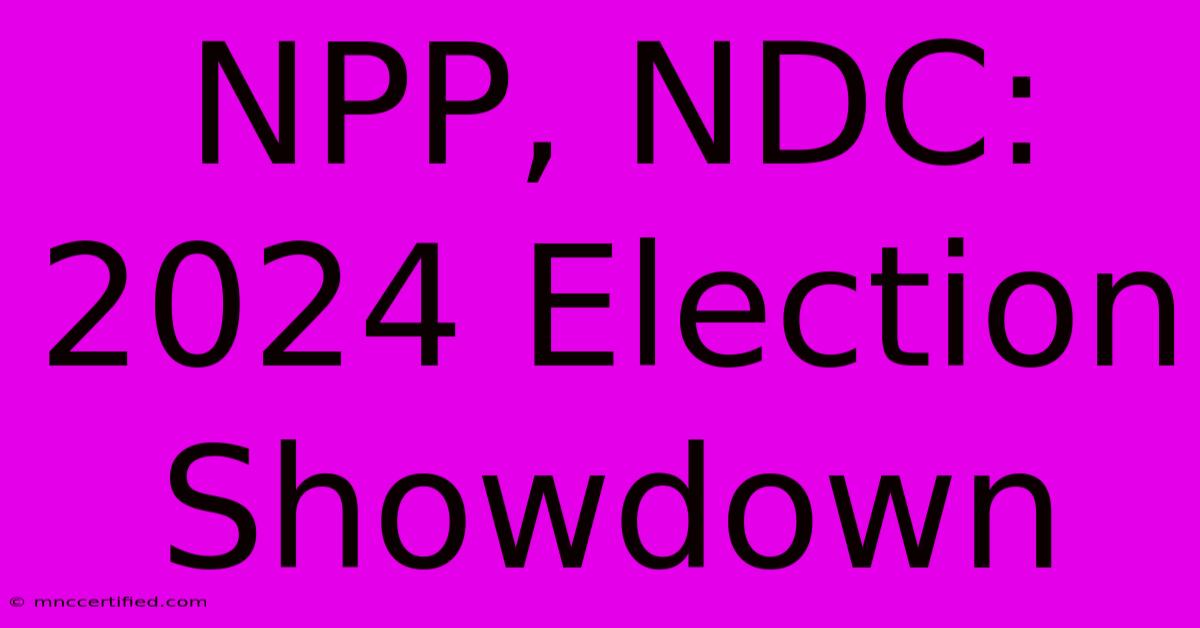NPP, NDC: 2024 Election Showdown

Table of Contents
NPP vs. NDC: The 2024 Ghanaian Election Showdown
Ghana's political landscape is heating up as the 2024 general elections approach, setting the stage for a crucial showdown between the two dominant parties: the New Patriotic Party (NPP) and the National Democratic Congress (NDC). This article delves into the key factors shaping this election, analyzing the strengths and weaknesses of each party, and exploring the potential outcomes.
The Contenders: NPP and NDC
The NPP, currently in power under President Nana Akufo-Addo, and the NDC, led by former President John Dramani Mahama, represent distinct ideologies and approaches to governance. Understanding their platforms is crucial to predicting the election's trajectory.
The New Patriotic Party (NPP): A Focus on Economic Growth
The NPP's campaign platform typically centers on economic growth and development. They often highlight initiatives aimed at boosting private sector investment, improving infrastructure, and creating jobs. Key policy areas include:
- Free Senior High School (Free SHS): A flagship program expanding access to secondary education. Its success and impact will be heavily debated during the campaign.
- Infrastructure Development: Significant investments in roads, bridges, and other infrastructure projects are often cited as achievements. However, criticisms regarding cost-effectiveness and debt levels are likely to emerge.
- Digitalization Initiatives: Modernizing Ghana's digital infrastructure and promoting digital literacy are also likely to feature prominently in the NPP’s strategy.
The National Democratic Congress (NDC): Emphasis on Social Welfare and Equity
The NDC traditionally emphasizes social welfare programs and equitable distribution of resources. Their platform typically includes:
- Job Creation: Focusing on providing employment opportunities across various sectors is central to their campaign promises.
- Improving Healthcare: Investments in healthcare infrastructure and access to quality healthcare are likely to be major talking points.
- Addressing Inequality: Tackling income inequality and promoting social justice are core tenets of their ideology.
Key Battlegrounds and Issues
The 2024 election will likely see intense competition in several key regions. Swing states will be closely watched, and the parties' strategies in these areas will be crucial. Major issues shaping the election debate include:
- The Economy: Inflation, unemployment, and the cost of living will undoubtedly be central themes. Both parties will likely offer contrasting solutions to these pressing economic challenges.
- Corruption: Allegations of corruption are frequently leveled against both parties, and addressing this issue will be crucial for gaining public trust.
- Infrastructure Development: The NPP's record on infrastructure development will be scrutinized, with the NDC likely highlighting alternative approaches and priorities.
- Education and Healthcare: The impact of the Free SHS program and the overall state of healthcare will likely be major points of contention.
Predicting the Outcome: Challenges and Uncertainties
Predicting the winner of the 2024 election presents significant challenges. The outcome will depend on a multitude of factors, including:
- Voter Turnout: High voter turnout could significantly influence the results, favoring one party over another.
- Campaign Strategies: Effective campaigning and mobilization of voters will be crucial for both parties.
- External Factors: Unexpected events, both domestic and international, could significantly impact the election.
- Public Perception: The public's perception of both parties' performance and their candidates will play a decisive role.
The 2024 Ghanaian election promises to be a closely contested and significant event. The competing visions of the NPP and NDC will shape the future trajectory of Ghana, making this election a pivotal moment in the country's political history. Further analysis, including pre-election polling data and expert commentary, will be necessary to gain a clearer picture as the election draws nearer. Stay informed and engaged in the democratic process.

Thank you for visiting our website wich cover about NPP, NDC: 2024 Election Showdown. We hope the information provided has been useful to you. Feel free to contact us if you have any questions or need further assistance. See you next time and dont miss to bookmark.
Featured Posts
-
Newcastle Preview Howe On Palace Clash
Dec 01, 2024
-
Host Home Provider Insurance
Dec 01, 2024
-
Ohio State Lands Wide Receiver Commit
Dec 01, 2024
-
Home Insurance Quotes Frisco
Dec 01, 2024
-
Tennessee Football Tops Vanderbilt Final Score
Dec 01, 2024